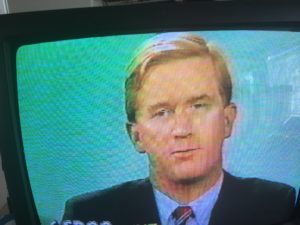In a 1994 TV interview, with the late Judd Rose, Massachusetts Governor William Weld was in top form.
He was wildly popular, headed for reelection as Governor with over 70% of the vote. He had been narrowly elected in 1990. His rival, the late John Silber, called Weld a “carrot headed WASP.” Affable and witty, and slightly off beat, Weld was anything but stuffy. He contrasted well with the stern Boston University president. Silber came to strongly approve of Weld’s work as governor. Weld was a patrician. He married a Roosevelt. One descendant signed the Declaration of Independence. His tough on crime, low taxes, socially libertarian pitch was popular in the suburbs, and with swing voters, and he was everywhere talked about as one of the GOP’s rising stars.
During the interview Weld ruefully recalled a college theatrical production, in which he wore a bunny costume. Reflecting later on the difficulties his libertarian stance on social issues caused him, in an increasingly fundamentalist party, he deadpanned, “if it wasn’t for the women’s clothing, I could have been a contender.”
Raised on Long Island, educated at Oxford and Harvard, the young attorney was an early investor in the Boston alternative newspaper, The Real Paper, and was trounced in a run for state attorney general in 1978. Rudy Giuliani recommended him for appointment as US attorney for the Bay State. He sent mobsters and corrupt politicians to prison, and famously resigned to protest ethical transgressions of Reagan’s attorney general, Ed Meese.
Reelected governor by the largest margin in Massachusetts history, Weld’s fortunes declined two years later. After considering a run for president in 1996, Weld instead challenged John Kerry for the senate, and lost badly. President Clinton nominated him to be ambassador to Mexico in 1997. Weld and Hillary Rodham were friends when they served together as young lawyers on the House Judiciary committee during the Nixon impeachment. Weld never took office. Senator Jesse Helms blocked Weld’s confirmation. In 2002 Weld divorced his wife of 27 years, a Harvard professor, the former Susan Roosevelt. He married novelist Leslie Marshall in 2003. He wrote a novel himself, titled Mackerel by Moonlight. He took the helm of Decker College in Kentucky, just as it went under. He moved to New York, and sought the GOP gubernatorial nomination in 2006, with the support of the state party’s sharp elbowed chairman, the late Steve Minarik. Weld lost to John Faso, who lost in November to Eliot Spitzer.
The old traditional liberal Republicans from New England is long gone. No more Ed Brooke or Henry Cabot Lodge. Weld is no liberal. Tough on crime, in favor of low taxes, and happy to have government not do much of anything, Weld supported the presidential bids of Jack Kemp, Mitt Romney in 2008, and John Kasich in 2016. Booed at the 1992 GOP convention for speaking in favor of abortion rights, in the political wilderness for twenty years, Weld never gave any indication of interest in leaving the GOP. It took the rise of Donald Trump to accomplish that.
He surfaced in 2016 to run for vice president, on the Libertarian party ticket, with former New Mexico Governor Gary Johnson, another ex-Republican. Weld promised fealty to his new party, but by the end of the campaign, he was frankly saying that stopping Trump was more important than a Libertarian victory. Weld quickly rejoined the GOP after the election, and has embarked on a lonely, principled, mostly unnoticed challenge to the renomination of Donald Trump.
Weld evokes memories of an earlier politician’s quixotic NH primary challenge to an incumbent president of his own party. Weld’s humor is less bitter than Eugene McCarthy’s, but he displays the same insouciance, and coveys the same impression of squandered talent, which makes it difficult for people to take him seriously. However much Republicans like the judges and tax cuts, Weld is hoping that enough Republicans are repelled enough by Trump’s contempt for democratic norms to allow him do “better than expected.” His only advantage seems to be that expectations are so low. Weld also counts heavily on independent voters, who can opt to vote in the GOP primary. Were Weld to even approach the 42% McCarthy drew in 1968, forcing Lyndon Johnson into retirement, it would be an even bigger surprise.
Trump is far more popular with Republicans than LBJ was with Democrats. Trump may face the most intense opposition any president has faced since the Civil War, but supporters, well over 40% of the electorate, are clustered in the Republican party. Trump is more of a fellow traveler than an actual Republican. Those who cling to traditional Republicanism — modest government, civility, character, stewardship, internationalism — have been run off or silenced. The rest cling to the runaway Trump train, terrified perhaps, but not daring to let go.
Bill Weld was always a happy warrior. This time he is more of a wistful once. More like a conscientious objector to popular but immoral war. He must grasp the realities of the Trump party. His brand of Republicanism is long gone. He seems determined to bear witness, not with any expectation he will be thanked for it, but for history, and for those who will rebuild after, as Weld seems certain, the current train ride ends badly.

